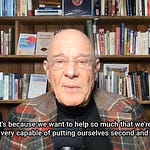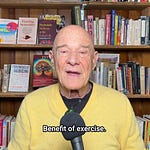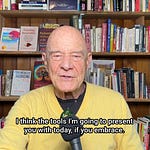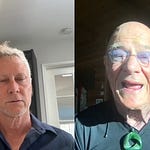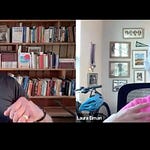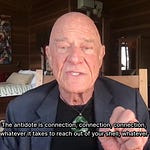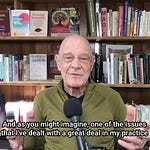Dear Listener,
I'm excited to welcome back to the program Obi Kaufmann, an artist, writer, and conservationist whose work beautifully combines science and art to tell stories about California's natural world. In our post-Earth Day discussion, Obi takes us into the complexities of ecological philosophy and the challenges we face in understanding and stewarding our environment.
Obi's perspective challenges conventional notions of environmentalism and our relationship with nature. He questions the very language we use to describe the natural world, stating, "Nature is a word that has very little meaning. I'm not exactly sure, on any granular level, how that can really be applied towards my experience of the world."
Can we define “nature”? What is the dividing line between the natural and the artificial?
We also explore the intricacies of California's water management issues, with Obi sharing insights from his book The State of Water. Despite recent rains, he warns that California hasn't seen the worst of the drought yet, explaining, "California, we do know historically – and in fact the people of California are still around to tell us about what happened – we're not talking about five years of drought, we're not talking about 20 years of drought, we're talking about centuries of drought."
Obi also discusses the paradoxical nature of our efforts to save the environment, such as destructive wind farms being built on nature sanctuarites, noting, "We're developing this systematic wholly paradoxical paradigm, where we are trading nature to save nature. We are spending nature to save nature."
Throughout our conversation, Obi emphasizes the importance of biodiversity and the resilience it provides to ecosystems. He argues that the balance between scientific innovation and indigenous-led ecological thought is a more positive and hopeful way of discussing the reorganization of thought in terms of social constructs and the concept of nature.
“[W]e are trading nature to save nature. We are spending nature to save nature.”
As we navigate the ecological challenges of the 21st century, Obi invites us to reconsider our relationship with the natural world and to embrace a more holistic, interconnected worldview. His upcoming book, The State of Fire: Why California Burns, promises to shed light on the complex factors contributing to California's wildfire crisis. Follow Obi on Instagram at Coyote Thunder, and while you’re there make sure to follow me as well.
I hope you'll join Obi and me for this thought-provoking discussion about the future of environmentalism and our role in stewarding the natural world.
Golden Light,
Dr. Richard Louis Miller
Links:
Obi Kaufmann - Artist, writer, and conservationist
The State of Fire: Why California Burns - Obi Kaufmann's upcoming book (Fall 2024)
Coyote Thunder - Obi Kaufmann's Instagram profile
Jedediah Smith - American explorer, cartographer, and fur trader
James Lovelock - English independent scientist, environmentalist, and futurist
Gaia theory - Hypothesis proposing that Earth functions as a self-regulating system
Timothy Morton - British philosopher and professor
Frederick Fritz Perls - German-born psychiatrist and psychotherapist
Gestalt therapy - Form of psychotherapy that emphasizes personal responsibility and focuses on the individual's experience in the present moment
Esalen Institute - Non-profit American retreat center and intentional community
Walker Ridge - Wilderness Study Area in California
Berryessa Snow Mountain National Monument - National monument in California
California Native Plant Society - Non-profit organization dedicated to conserving California native plants
Tuleyome - Non-profit organization protecting both the wild and agricultural heritages of California's Inner Coastal Range
Wade Crowfoot - California Secretary for Natural Resources
30x30 initiative - California's goal to conserve 30% of the state's land and coastal waters by 2030
Listen to Learn:
How does Obi Kaufmann's background in mathematics influence his approach to ecology and conservation?
What connections does Obi draw between economics and ecology, and how do these disciplines intersect in his work?
How has the Marxian slogan "from each according to his ability, to each according to his need" inspired Obi's views on natural resources and environmental stewardship?
What role do indigenous critiques play in Obi's perspective on conservation, and how does this shape his approach to ecological management?
What implications does California's transition to 100% renewable energy sources have for other regions, according to Obi's observations and experiences?
How does Obi describe the impact of biodiversity on the resilience of ecosystems, and what lessons can be learned from California's environmental strategies?
What challenges and paradoxes does Obi identify in the pursuit of sustainable energy solutions, particularly concerning the use of solar panels in desert environments?
How does Obi Kaufmann integrate his artistic talents with his environmental activism, and what impact does this combination have on his publications and public outreach?
My Books
Freeing Sexuality: Psychologists, Consent Teachers, Polyamory Experts, and Sex Workers Speak Out
Psychedelic Wisdom: The Astonishing Rewards of Mind-Altering Substances
Psychedelic Medicine: The Healing Powers of LSD, MDMA, Psilocybin, and Ayahuasca
Integral Psychedelic Therapy (co-edited with Jason A. Butler & Genesee Herzberg)





